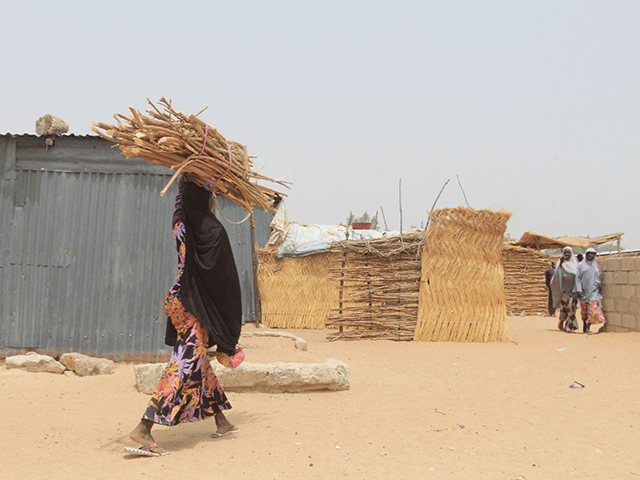The government of northeastern Nigeria’s Borno state confirmed on Monday plans to close camps for internally displaced persons (IDPs) within Borno after receiving multiple complaints about alleged “rapes among youths,” drug use, and various other crimes committed at the shelters, some of which house victims of the Islamist terror group Boko Haram.
“There are rising cases of rape among youths in the IDPs. There also issues of drugs and so many crimes and inhuman activities going on in these camps,” Isa Gusau, a public relations spokesman for the Borno State governor’s office, told the Punch, a Nigerian online newspaper, on October 25.
“The state government, after looking at the inherent dangers and consequences of these atrocities, decided that such camps be closed. It is for the good of the IDPs and the general populace,” Gusau stated.
The spokesman said state officials plan to fully shutter all IDP camps operated by Borno’s government by December 31.
“There are 28 official IDP camps spread across the state while several hundreds of host community camps still abound,” the Punch reported Monday, citing an unidentified “source in the humanitarian circle in Borno who is not permitted to speak to media.”
The source implied that Borno authorities had shut down two official IDP camps in the state as of this week.
“He said the camps, with the exception of two, were still very active as more IDPs were still finding their way to the camps,” the Punch reported.
A resident of an IDP camp in Borno’s capital city, Maiduguri, told the Punch on Monday he has lived in the state-run shelter for seven years.
Bitrus Jarma, 52, who identified himself as a displaced father of five, told the newspaper, “We have not been told we will be leaving the camp by the end of the year. We have been in this camp for over seven years and I am from Gwoza.”
Gwoza is a town located 84 miles southeast of Maiduguri, near Nigeria’s border with Cameroon. Jarma said he and his family have been unable to return to Gwoza for nearly a decade because Boko Haram terrorists control the town and its surrounding area.
“We share [our] border with Cameroon. Boko Haram are still operating in our village. I wonder where they will return us to,” Jarma said, referring to Borno state’s plans to shut down IDP camps.
Boko Haram is a jihadist terror organization that launched a violent insurgency in northeastern Nigeria in 2009 with the aim of creating a regional Islamist caliphate. The insurgency has since bled into neighboring Cameroon, Chad, and Niger. Terrorist attacks by Boko Haram have killed roughly 350,000 people across the Lake Chad region, which unites northeastern Nigeria with its neighboring states, since 2009. The insurgency has also displaced an estimated three million people regionally, with 310,000 people displaced within Nigeria alone.
The refugee crisis forced Borno state to construct IDP camps for its domestic refugees over the past decade. Boko Haram continues to perpetrate attacks across northeastern Nigeria and other parts of the country, meaning most Nigerian IDP camps remain full. Borno State has not addressed how it plans to relocate IDPs from the temporary shelters once it closes the camps at the end of this year.
Nigeria’s federal government has a checkered relationship with the country’s own IDP camps. The Nigerian Air Force bombed a Borno state-run IDP camp in 2017, allegedly by accident. Nigeria’s Vanguard newspaper estimated at the time that more than 100 people were killed in the bombing, which the Nigerian military claimed was intended to target a Boko Haram outpost.

COMMENTS
Please let us know if you're having issues with commenting.